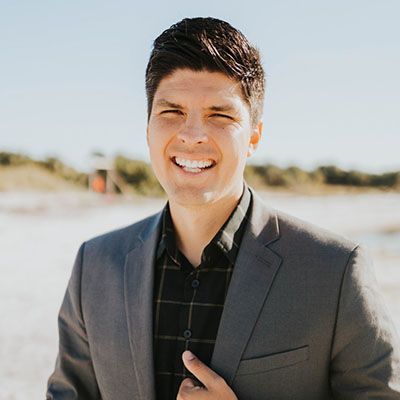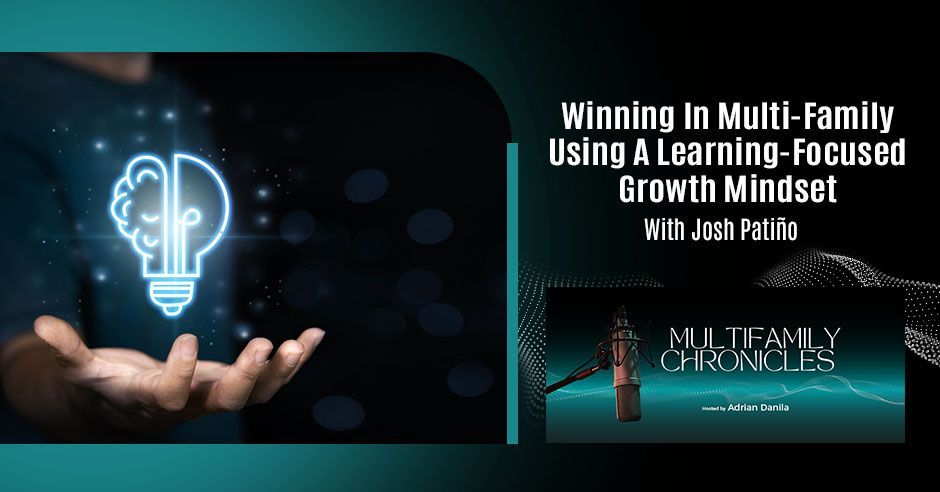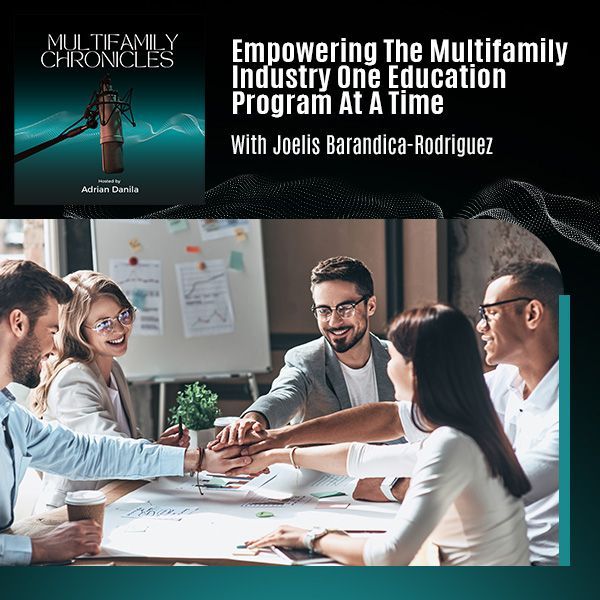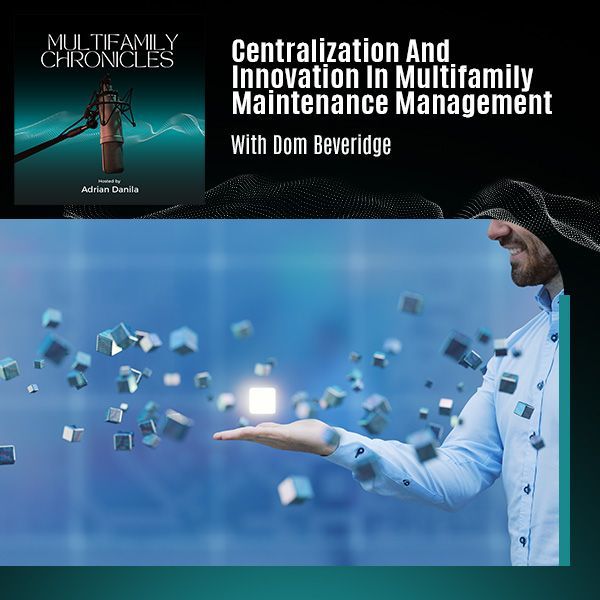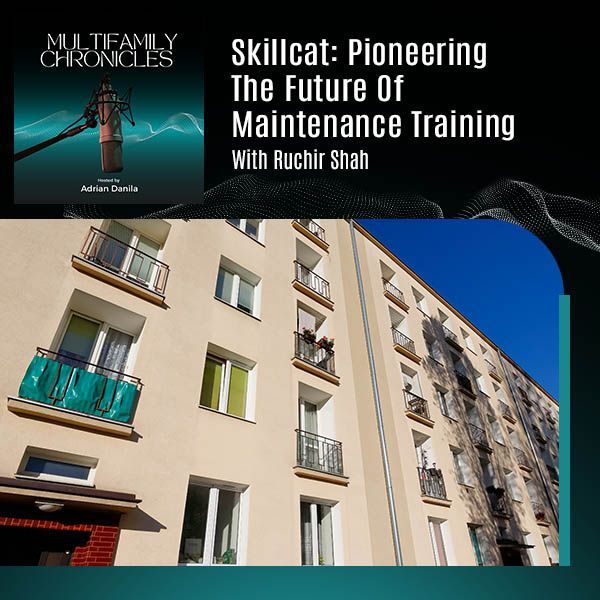Winning In Multi-Family Using A Learning-Focused Growth Mindset With Josh Patiño
Refusing to change and simply settling with the things you are used to hinder you from embracing new opportunities to improve. By having a learning-focused growth mindset, you become more open to positive changes. Adrian Danila sits down with Josh Patiño, Regional Vice President of Sales at Funnel Leasing. They discuss how Josh nurtured such a mindset from his decades of coaching soccer teams. Josh talks about he helps build bridges and share ideas in running the multifamily industry’s only Renter Management Software platform. He also explains how getting a coach, leveraging machine learning, and having the openness to learn are vital elements in building a strong network.
---
Watch the episode here
Listen to the podcast here
Winning In Multi-Family Using A Learning-Focused Growth Mindset With Josh Patiño
I want to start by thanking our supporters and partners from Coastal Painting Contractors for supporting the show. Let’s get to our guest. Our guest is Josh Patiño. Welcome to the show, Josh.
Thanks, Adrian. I’m super pumped to share the next little bit with you and to be on the show is amazing. I remember when you first started. You’re Episode 31. Kudos to you.
Thank you, Josh. You are the Regional Vice President of Sales with Funnel Leasing. Let’s start by introducing you to the audience. Tell us a little bit about your background and what you’re currently doing for Funnel.
I’ve been with Funnel for under two years. I joined the multifamily industry at that time when I made a career change. Most folks don’t know this about me but previously to that, I was a college soccer coach. I coached women’s soccer at Gonzaga University. Previous to that, I was at a smaller D3 University in Virginia, Southern Virginia University, on the men’s side.
To keep going backward, I played soccer collegiately. My dad is from Peru. There’s only one sport in the world, and that’s soccer. I grew up playing soccer. All my siblings did. I always thought I was going to go pro. Every kid thinks they’re going to go pro. They’re going to play for Barcelona or England, and they’re going to be the best. At one point, I realized that I’m not good enough to be at that level and the commitment. I didn’t know that I had that much drive in me to pursue that.
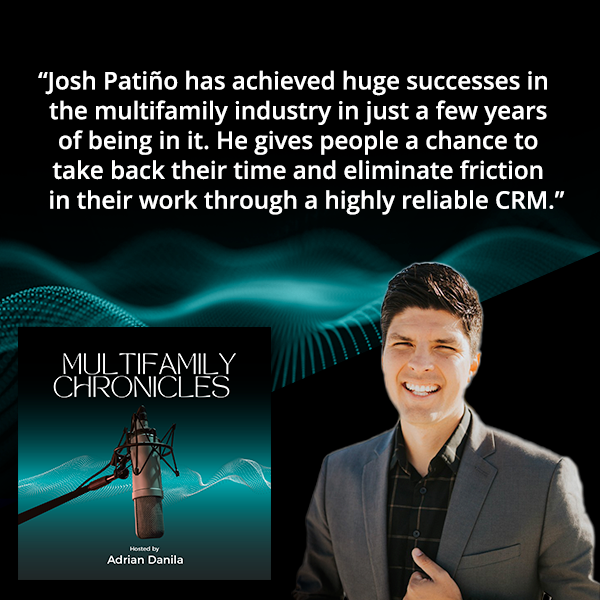
I got into coaching and fell in love with coaching more so than I thought. I don’t know if I got lucky or if I was fortunate at the right time but I started youth soccer coaching nine-year-old girls and then started coaching middle school-aged boys. I got into high school. At one point, I was coaching five youth teams. I started two indoor centers in Utah where I was. I loved the training. I had this passion for training players and developing athletes.
I got an opportunity to go to Southern Virginia University, and I couldn’t pass it up. I was 27, turning 28, and feeling pretty inadequate. Maybe it was too soon but it’s an opportunity that you can’t pass up. Four years later, I had the opportunity to go to Gonzaga. I went to school at Brigham Young University. Gonzaga is in the West Coast Conference. They rival each other in basketball a little bit. I couldn’t pass that up either.
Previous to Funnel, I had this great run with Gonzaga. I enjoyed it, and then I had to make a choice. My wife was pregnant with our third kid.
COVID had stopped everything at the schools. The kids had gone home. The only reason coaches exist is they’re there for the athletes and the students. As soon as they went home, my purpose quickly diminished. As much as you can do in the virtual world, there’s only so much you can do for athletes over videos and Zoom. We have all the NCAA rules to deal with as well. Recruiting and everything got put on hold.
One of my favorite things is preparing for the next game. Even at the very end of your season when you finish the game, win or lose, it’s the start date for the next year so you can immediately go to the next season. You have 8 months or 3 months to prepare. That was hard for me. That was a hard adjustment. I reached out to a friend of mine who had reached out to me through LinkedIn a couple of times and who I ignored because I was like, “I have the best gig. I get paid to play soccer, be on the field, and be with young athletes in a college. I have freedom over the summers.”
I reached out to him. I saw that he was a CEO and I said, “What is he doing?” He was a college teammate of mine as well. I got super curious. He told me a little bit about Funnel and what they’re doing and said, “We’re hiring. You’re not the best candidate for this position because you don’t have any SaaS experience or sales experience but you have charisma. You’re a good human. That makes a good salesperson. I’ll let our VP run our recruiting process. If it works out great and if it doesn’t, I’ll help you find something.”
I went through the process with our VP of Sales at that time. It turned out to be a good fit. I moved to Tampa, switched careers, and dove in two feet into multifamily. A lot of people ask, “Did I have to move because there was a job requirement?” The answer is no but I’m one of those people who if I had stayed in Spokane by Gonzaga and would have had a hard time not going to games or trying to be involved.
I felt like I needed to burn the boats, make the move, and hedge all my bets on Funnel. It has worked out pretty well. It has been a good ride. That’s a little bit about my background. What I do for Funnel is I started as an account executive, and then I was promoted to Regional Vice President. I started with one territory. Now, I cover the entire United States, which is too much to handle. There are so many property management companies. I help owners and operators form their businesses.
That’s a little bit generic and vague but what we do at Funnel is very unique. We’re not just a CRM that you plug in, and things are better. We help folks centralize. We help folks with their staffing challenges and implement AI and CRM. We’re working through the resident side and the application side as well. It’s more than a leading management tool. It’s a business transformation tool. I work with owners, operators, and third-party managers every day and get to hear about their pain, their objectives, and how we can help solve what they’re looking to solve.
That’s quite a story. That’s an amazing story. I knew of your story. That’s why I wanted to bring you to the show right here because a lot will be inspired by your story and your trajectory coming into a brand new industry and being so successful in about two years. My next question for you is this. Could you tell me how the product that you use at Funnel is improving the experience or the life of the end user? Specifically, how does your software help people in a leasing office, for example, to make their life easier, take certain tasks off their hands, or have this frictionless experience? Could you think of a few examples?
I appreciate the opportunity to share. Very specifically, a part of our lead management platform is marketing automation. When people think about automation, we send out these robotic messages. They’re autoresponders and generic. Instead of even saying, “Adrian, thanks for your inquiry,” we get specific to, “Adrian, thank you for reaching out to X community. You asked a question about pets.”
We will answer your question about pets but it will also prompt the next preference we need to find out. That could be, “What’s the layout that you’re looking for? What’s your price range? When are you looking to move in?” All of that can be automated. If you think about that, it’s taking time off the leasing agents from having those conversations via email.
The other piece to that is that we want to free up their time. I was talking with a prospective client. They made a comment, “Our price is listed right on the website. It’s listed right in the middle of the page. You can’t miss it but the number one question we get is, ‘What’s the price? How much does this layout cost?’” If you think about how often our onsite teams are answering, “What’s the pet policy? What’s available? What’s the price?” The time they spend on that, what could they use that time for? Number one, we take off all those mundane questions and then tasks.
The other piece with marketing automation is when I speak to somebody on the phone, let’s say I book a tour, it will prompt the proper next step for the leasing team so we can have a consistent experience across the board. I will often say, “It could be the Patiño properties way, the way that I do business, and the way that I want my leasing teams to interact and interface with these prospects. I can lay out and define proper next steps and change those.”
We went from an environment where self-guided tours, for example, were the only way folks couture virtually, and now we’re back to in-person. We need to adapt, change again, and offer more. That’s one way that we save time specifically. You talk about this a lot on your platform but staffing is an issue across the board. I don’t know if that’s going away. As much as we keep moving on with time, staffing continues to be an issue.
The AI solution that we provide after hours proves all the value in the world. An onsite team could be answering emails. Even now we have click-to-text and some new things coming down the pipeline. Folks can now be people and be human, spend more time on tour, spend more time helping people through leases, spend more time with residents, and do everything else they have to do. Those are a couple of things that help the end user.

The other one that I’ll mention is our online leasing platform. I was sitting with a company in Boston and listening to their experience. Before we even begin, let me set the table here. He said, “If you think about Amazon, it’s so easy to give them your money. You click one button, and the transaction is done. If you think about hotels or Delta, it even saves your credit card information through the internet. You’re not even putting in your card. You’re not exchanging cash. You don’t feel that it’s gone but in multifamily, that process is so painful.”
“People are willing to spend $2,000 to $3,000 on a unit and live in their home for the next year. You multiply that. That’s $36,000 a year. We make it so hard for them to give us their money.” It was music to our ears. We have designed and rolled out a platform that is a mobile-first online leasing experience where they can do it all from their phone. We had someone go through the process and have fully executed a lease in less than nine minutes, which is very different than how things are done. From a customer experience side and then an onsite experience side, those are a few key areas where we save time.
I can attest to the end user experience. I have a couple of things to share. You mentioned the price. I happen to advertise a property of my own for sale. That’s what I’m being asked all the time. The first question is, “What’s the price,” even though it’s right there. It’s a marketplace app. The price is on the app, and people are still asking. You have to go back and feed the same information that’s in the ad, to begin with. In the second part, you said something very interesting about how hard is it in property management, in general, to get things accomplished.
There’s a thing that I was thinking about for more than a couple of days. I’ve been thinking about it for a while. You mentioned Amazon and how easy it is to take your money. I’m going to make a parallel here, which doesn’t have anything to do with leasing. It’s procurement. Imagine this shopping experience where you go to Kroger, Walmart, or your favorite store, you put things in a card, and you see the price tags. You’re expecting to pay $50. The cashier checks everything in and says, “Sir, it’s going to be $59.63.” Between the time you picked them up from the shelf and the time you’re checking items out, the price has changed. How would you react as a customer?
This is a real experience in property management. Vendors that sell most of the maintenance supplies especially have what is called static catalogs that are uploaded once a month. In between those 30 days, prices change. You go and shop, and then your invoice comes at a different price. Here’s the service manager or the regional manager putting all that work into doing change orders because the vendor doesn’t have a better option to give them real-time pricing. It’s pretty fascinating to me. There’s so much room not in leasing but, in general, in our processes to improve.
We as an industry are accepting that’s okay to put all those manual labor in. Our people could spend their time more efficiently doing tasks that make a difference, especially with the labor shortages. Something like your product or what you’re offering is giving them time back in their day. It’s a thing of the present and of the future is going to win. The second is eliminating friction. Your potential client in Boston was saying, “We’re making it so hard. Make it frictionless. Eliminate all the friction. Do you want my product? Do you want to rent here? This is all you need. All you have to do is to click Accept, and we will let you in.”
That made me think of one other thing. When you think about property management as a whole, I know that we focus on community or a per-community basis. That’s one massive differentiator with Funnel. I live in Tampa. If I were to look for an apartment, and there are several right next to me but let’s say they’re all owned by the same property management company. If I’d go to each one and inquire, I’m going to get three emails and phone calls, one from each community.
When you think of it from a corporate standpoint as an owner or especially in operations, I have three leasing teams working on one lead. Although in our reporting, it shows as unique leads, it’s the same person because the software doesn’t talk together or recognize it. What we have done is that we have been able to work with partners and recognize, “When Josh inquires at three of my communities, I’m going to centralize or have one team work on that one unique lead but help cross-sell the other two communities that he’s also interested in to keep him within the portfolio.”
Instead of competing with ourselves, we can now work together because what ends up happening is you have three teams working with each other. From an efficiency and operations standpoint, it doesn’t make sense to do that. We help consolidate, create one guest card, and then tag the properties to it. That’s a big differentiator when you think about time, processes, and efficiency. I love what you said about how we’re okay with it. We have become accustomed to it. It is that way, so we’re okay with it. We will adjust and change when the reality is we can challenge, change, evolve, and adapt. That’s the future.
That’s why companies like yours could and will make a difference. I’m betting on technology. There are certain things that technology won’t be able to do to fix someone’s air conditioning remotely and things of that nature. It could help. It could be an enhancement to the process but there are certain things that only humans can do. There are certain things that humans are bad at like comparing technology to artificial intelligence.
I’m bringing individuals and professionals like you to the show to show that there are better ways of doing things. Even though it’s not necessarily what I do for a living, I’m very passionate about the processes and making things better. The companies will see the deficiencies and the challenges that we as an industry have in our processes and that we’re okay with. We settle for them because this is the way it has been done forever. They challenge or come up with a solution for their potential clients. This is where the big wins are.
When Funnel started, and this is a little bit before my time in 2019, we were fortunate to work with some of the largest operators but also the most willing to be on the edge of technology. Fortune favors the bold. Those are some of the folks that are a little bit further ahead in terms of centralization. Role specialization has reduced salaries and has been able to cross-sell most efficiently. They’re seeing the ROI of their activity from years ago, and now they’re prepped. When COVID hit, they weren’t as impacted.
People who are most willing to be on the edge of technology are a little bit further ahead in terms of centralization.
I love the fact that you brought up ROI. They’re seeing the ROI. The assumption is that they’re using some KPIs to track your services’ performance. One of the things that I’m seeing way too often in our industry on our management side is that there are no KPIs to measure, for example, training or the efficiency of a product. Typically, the way it goes if you have a great sales pitch is the property management company will copy your words.
If they’re being asked, “How is this improving our processes? What type of enhancement does it bring to the process?” the answer that you get from the top floor is exactly the sales pitch. That tells me that there’s no regulating the sales pitch to say, “Let’s test this theory. Let’s try to put some numbers to it.” I’m big on being able to quantify. What you can’t measure, you can’t improve. You can’t say something is great based on some feelings when you don’t have some numbers or a way to measure things to back up your statement with.
One of the things that have been difficult and one of the biggest things that I’ve picked up in the industry in the past few years is I have yet to find two companies that operate the same way. They may operate similarly but they operate so differently. There are a ton of variables. Technology is one. The other one is frankly people’s initiatives. When you go to the site level too, the other variable is the onsite folks. I often will hear, “This community has an all-star onsite team,” which tells me the other communities aren’t like that. This is a one-offer standout community.
In our industry, we have third parties, owner-operators and a mix. Budgets may vary across the board. If you look at the whole property management company, you have some that are owner-operated and fee-managed, which may be using different software. It’s difficult for companies to provide KPIs across the board. Even across our Funnel portfolio, we have folks that use call centers and a centralized location or regional hubs. They’re operating traditionally and using a cross-selling feature. We have some that are using AI, and others that are solely using marketing automation. We have others that are using online leasing.
When you look across the board, there are a lot of variables that make it difficult but I am 100% with you. You can’t improve what you can’t measure. Our challenge to the partners that we work with is developing KPIs specific to their operating model. For example, somebody is using a call center. We were able to reduce their call handle time from 8 minutes to 4. That’s an immediate ROI. They’re handling twice as many calls now.
When you think about centralization and role specialization, I’ve spoken to a few companies now that are removing the assistant property management role from onsite and moving them to offsite, or creating another role to handle multiple sites and doing the initial phone call, the tour booking, and the follow-ups. The onsite team is the in-person. Let’s take them on a tour in applications and help with that but renewals are moved offsite. It’s focusing on their individual operating model. KPIs are directly associated with the way they operate.
One other thing that I’m sure you from a sales perspective has probably one of the biggest challenges is how you find in a group the decision-maker because the decision is not made by the same person in a different organization in the same role. Let’s say it’s the Vice President of Operations. There are different people that are making decisions about which software and technical solutions to use. I can imagine that it provides an extra challenge for you. First, identify who is the right person in that organization that will make a decision, whether they’re going to use services like yours or not.
Often, the first person that inquires may be given the initiative by the decision-maker. They’re doing the evaluation process. One thing I’ve noticed is more decisions by committee. There are a lot of folks involved anywhere from 5 to 12 in the process and the evaluation. One thing that I’ve enjoyed doing more is even getting the onsite teams involved so that they can see the product beforehand rather than after the decision is made, “This is what we’re going to use.” That has been valuable too.
Sometimes in our follow-ups or as we go further through the demonstration or the solution phase, we will often speak pretty directly and want to get some insight into who is the ultimate decision maker here. We want to coordinate with that person to understand why, “What’s the business objective here?” The question I always like to find out is, “What happens if we don’t change? What’s the impact if there is no change?” Oftentimes, that’s also insightful to realize that this is going to be an investment but to your point, if there’s no ROI, what’s the value in doing it?
As soon as you realize the impact of not changing, you can get pretty aligned on timing and the scope of the project and also key in on what’s most important. We go across the board through all the stakeholders and find out what’s important. What’s important for operations is not going to be the same thing as what’s important for marketing. Brand, copy, and what’s being sent out are very different than the actual processes and workflows that operations want to follow. My job is to tie it all together and provide a solution that meets those needs.

You’ve been in the multifamily space for only two years. That’s a very short period compared with most of the executives in our industry, whether it’s the management side or the vendor partner side, who have been in their roles probably for a lot longer but I would like to get your take on coming from outside the industry. What are some things that you love about multifamily? Tell me about some things that you think we could do differently and do better to make the business run better than it is currently.
When I first came over, I felt like an outsider. A lot of times in meetings, I felt like an imposter because I often felt like they were looking at me and saying, “Who’s this guy? He comes from a soccer background. He has no idea what we’re doing.” That was difficult. I hadn’t spent any time on site. I didn’t know the objectives or the real business behind property management. Probably four months in, I had a wake-up call and realized that number one, I’m a consumer first.
In 2017 when I moved from Virginia to Spokane, I rented an apartment. The process to find an apartment was so painful. To paint a picture here, I drove 30-plus hours from Virginia to Washington. I let my wife go to her parents because she was pregnant, and there was no way she was going to drive in a U-Haul truck. We were going to fly her. I had a two-year-old. I’m in a hotel room. Granted I should have done some pre-work and looked online but I hadn’t rented an apartment in 6 to 7 years.
I drove around for two days going from location to location. I called. Nothing was available. They wanted an offer letter and all this information that I didn’t have that was packed away. The prices were a lot higher than I thought. I was frustrated because even when I inquired and applied, they said it may not be ready for two weeks. I’m like, “I can’t stay in a hotel for two weeks. That’s money out of my pocket every single night. I have a U-Haul truck that I’m paying for that I need to return. I need to unload it. My brother who came with me also needs to get home.” Some of this is on me but my experience was difficult.
Finally, I got into a place. I showed up on a Wednesday, and she had it ready for me by Friday. That was it. I was done. I got her all the information. I still had to go back and forth a ton via email but I was motivated to get in, and I got her all the information. Thinking back now, if I wasn’t motivated, it would have been so easy to ignore all of those emails. I could understand the frustration of an onsite team member trying to gather information but also on the other side, from a consumer experience, I would be frustrated. Why do I have to provide repetitive information or all of this stuff? There has to be a better way.
I realized that I’m a consumer first. I interface with some of the biggest brands as many people do like Amazon. I prefer Delta for my personal travel and Marriott when we go through hotels or Airbnb if it’s a family vacation. One of the largest things that were interesting is being a soccer coach. I got gear every single year. The swag is the best when you’re in athletics and college athletics but I was extremely particular about our Nike gear. Nike takes care of you. Nike provides a great experience for their athletes. They continue to come out with new lines of clothing. They’re sweat-wicking. They’re thinner and lighter, everything even from the shoe.
As soon as I joined Funnel, I started to look at property management differently. I own two properties. I sold one. I’m a property manager as well. I use another company. I’m probably more of an owner. I have a third party managing the company because we’re so far away. A couple of things right off the bat that I realized is that multifamily is unique. Everybody operates very differently and has their spin on different things. If you were to ask people what centralization is or if AI is useful, you would get a wide variety of answers. There are folks saying yes to AI and no to AI. It’s not all human-based.

You have folks talking about centralization, “It’s the future. No way. That’s never going to happen. We will never get to that point.” It’s very unique and similar. Something that I take from my coaching background is that a large part of my job was recruiting. I spent a ton of time evaluating players, recruiting them, getting them to campus, and then selling them on the idea of coming to play at Gonzaga University. I can’t tell you how much stuff I say on LinkedIn, “I’m hiring. I’m recruiting. I’m retention.” The other part of my job is recruiting.
You have to keep them at our school so they don’t go somewhere else. That’s so relevant to how from a corporate level, we’re recruiting all these folks, “Can we keep them?” That’s ongoing. The other thing that I see as what people continually need is probably and what I’m so passionate about is training. As a coach and a player, when I was a player, the number one thing I did to get better was spend extra time outside of practice. If I wanted to get better, then I couldn’t show up to practice with everybody else because I would only get better at the same rate as everyone else, and I’m already behind.
When I look at the multifamily industry and all the turnover that the onsite teams experience and even at the corporate level, there are VPs of marketing that are switching, SVPs, and new people filling roles but at the site level if they’re coming in and they haven’t used a software that was implemented, the bottom line is you can never train too much and you can never help your folks enough. The one thing that I realize as a coach is even my star players or the best players still needed time outside of practice to hone in on their craft or their specialty.
You can never train too much and never help other people enough. Even the best players still needs time outside of practice to hone their craft or specialty.
Our head coach or the gentleman that I worked with previously never asked, “What are you good at?” We would get generic answers. He would ask, “What are you best at?” It’s interesting what people would say to that. From an athletic standpoint, it’s, “I’m the fastest. I’m physical. I’m the hardest worker.” 9 out of 10 people would say that. I remember vividly the people that spoke differently and said, “Frankly, I’m a goal scorer.” She’s a little overconfident but I would say that she is. You look at onsite teams. We’re hiring, “What are you best at? How can we amplify that? Is that something that we need? Can we help put them in their place?”
The other interesting thing is as a coach, you bring in all these players. From year to year, we would need to move them to fit the style or the new face of the team. I don’t mean faced by the new player but as a team, you evolve. You’re going to change because of a new style or a new method you’re implementing. Putting people in the right place is by far the hardest thing because you need to be right for them to be successful. It’s easy to find out if they’re not in the right position because they’re underperforming.
I’ve seen things in property management too where you go from a leasing agent to an assistant property manager to a property manager but from a leasing professional to an assistant property manager, the skillset between the two doesn’t translate super well. If you want to get into marketing, that’s probably not the route to go. Please understand that I’m saying this from a very short time in multifamily but this is what I’ve heard from folks.
In understanding and being a consumer and a coach, training is important. You can never train too much. The last thing that is unique that I bring or that I’ve seen is I’m a people person at heart. I love networking and connecting with folks. It has been fun to have an opportunity like this. This is a great example but at the same time, our industry is so open to learning, connecting, and helping other people do exactly what you’re doing, Adrian. For me, that’s extremely attractive. That helps bring people together.
On the flip side of that, more of that can be done even more. On the supplier side, it would be great to get more folks together to help improve the sales experience or the buyer’s journey. On the property management side, we’re very protective of our way of doing things. We could be more open and share. A great example from the coaching side and then from my current job is I remember our head coach. Somebody asked to come to practice. Another school in the area said, “Can we watch it?” My first reaction was, “I do not want you coming and learning all of our secrets and what we’re doing.” I approached our head coach, and he said, “Have them come. We have nothing to hide here.”
It surprised me. I had to ask him, “Why? If they want to try it, they can try to replicate what we’re doing. That would be up to them. We’re going to focus on us. We’re open.” I would say the same thing here. Our CCO Tyler Christiansen is so open to letting people look at our software, integrate with our software, and view it. Even folks say, “I want to see what’s out there. I would love to take a peek behind the curtain.” We’re so open to sharing. I would say that has attracted a lot of folks to come in as well, get behind, and be a part of the community. Those are a couple of things that are top of mind.
That’s super interesting. I’ll label you an outsider. Even though you’re two years in, you’re not that much of an outsider anymore. You said something very fascinating to me. I had an experience. Someone commented on one of my posts, “We’re the company that provides whatever services.” I was mentioning my post. I reached out and made a request to meet with someone to tell me about the software. First, they asked, “How would this apply to my company?” I said, “It’s not for our company because we’re building our software. It’s in my interest so we could find out from our clients.”
At this point, I’m not willing to disclose. I said, “Imagine if I would have found that interesting. I would write about it. I would probably do an episode about their product.” Right from the get-go, they block me off and say, “Talk to our customers.” I don’t want to talk to your customers. I don’t need this product. I have a curiosity. If it’s a great product, I’ll help you promote it. It won’t even cost you a dime.
What’s the downside here? It’s keeping everything close to the chest. I don’t think that’s the way to go. If you follow me on social, everything that I know I share with the work. At the end of the day, some of my ideas are not the best but everybody is free to try. Why don’t people go ahead and try? If they find value in it, they’re going to come back for more. That’s where the value is in. Someone takes one of your ideas and tests it. If it works, they will come back for more because if it has been tested and proved to be working, why not do more of that?
I can empathize with you. I’ve had the same experience too. We’re not a large sales team here at Funnel. Tyler even posted about it. We’re a sales team of two. We will have folks reach out to us about software as well. When they find out we’re a sales team of two, they’re a lot less interested in the opportunity. The harm with that is it makes people feel like, “We’re not as valuable anymore to this group.”
I understand that at the same time, they want to protect their time. They may have bigger opportunities but in other industries that I’ve been to, you don’t ever want to burn bridges. I don’t think that’s new to anyone else but oftentimes when that happens, it leaves a sour taste in our mouths. We’re probably not going to look at that company again for a long time.
I get it from both sides. I understand but I am more on the side of sharing, not having anything to hide or not wanting to hide, and giving other opportunities to people to learn. Sometimes that’s hard. Time is a very valuable asset that no one has a lot of. I’m always grateful. That’s probably something important too. Always remember gratitude on it too. I know that you do a great job of that posting about everything that you share and amplifying the message to so many other folks.
Thank you for saying that. My next question is this. From a newcomer to the industry to vice president, that was an amazing journey, I’m sure. What are a few things that will help you get to a vice president level in such a fairly short period? What are the things that helped you? What are some things that you want to share with someone that wants to follow the same path?
I came in. I didn’t have any expectations. I didn’t know what to expect but it was the first time I had a quota. I felt a lot of pressure. I was wondering how I was going to feed my family. When one month goes by, you’re probably not that worried too much. You may start to think about things. 3 to 4 months in, I was getting super nervous, “I need a fast track. I left a job where I was comfortable and where I had made a name for myself and had a pretty strong career. Now, I’m changing.”
For folks that want to get better, I would recommend hiring a coach, whether it’s a life coach or a business coach, or getting a mentor even and having someone that has been where you are and can walk you through it. The other hard thing is I paid for it out of my pocket. It was not as inexpensive as I was hoping it to be, especially when I wasn’t making what I thought I was going to be making but the value that I got out of it was incredible.
If you want to get better, hire a coach. Put your trust in someone who can help you walk through life.
It was so good that I was willing to invest a second time with another coach to get better. I had two coaches over six months. It skyrocketed me and put me on a track that I am still on. I’m super grateful for the opportunity. One thing that one of my coaches talked to me about was, “You’re going to get out what you put in.” For life, I live by that as well.
If I want to be a good dad, I can’t sit on the sidelines and let my wife parent alone. I can’t sit on the couch, read a book for myself, and let my kids be distant. I need to be active in the process. I would say the same thing in a marriage. If I want to be a good husband, I can’t sit on the sidelines. In my job, if I want to be a good salesperson, and I want to learn the multifamily industry, I can’t sit on the sideline.
I spent time on site. I’ve called countless communities. I’ve read so many articles. I’ve reached out to folks. I had several one-offs and then learned the sales side of it and the process. There’s no replacement for hard work. You can work smarter but for someone who doesn’t know how to work smarter, you have to work hard and put the time in. For me, that was it. I spent early mornings and late nights when my kids were down to read, study, and practice. I failed over and over again.
I will never forget the first call that I had with a client. I’m so grateful my VP was on. That helped me get better for my next call. When I was closing my first deal working with a partner, I remember having meeting after meeting. My VP of sales was like, “What’s the outcome of all these meetings? What is your goal?” I said, “I don’t know. I’ve never been here before.”
That was also a good learning curve for me to know. If we’re going to have a meeting, we need to have an objective. What’s the outcome for both sides? What’s mutually beneficial? It’s small things. Failure is a big part of the process as well. Summarizing all that, if you’re able to get a coach, work hard, master your craft, and learn as much as you can. Focusing on those things and yourself is helpful.
Thank you for sharing. Our next question is related to the previous question. What advice would you have for a young person ready to enter the workforce?
I’ve thought about this one a little bit even previously because we’re all told when we’re young, “Do what you love, and you will never have to work a day in your life.” I loved soccer. I don’t think I can express in words how much I love the sport and what it did for me. Where it stems from is what it did for me through my youth years, my development, and my growth.
What I learned on the field playing this game is, for me, invaluable. It’s something I want for my kids. There are so many life lessons that I learned. I love this sport. I did it. I went through and played college, which not every kid gets. I went to a school of 30,000 to 35,000 kids. I was one of 30. I frankly represented 3,000 to 3,200 students. I was so grateful for the opportunity. I coached, and I loved it. I loved coaching.
What they don’t tell you and what I would say is you don’t know what you don’t try. I had no idea I would love multifamily PropTech sales. Frankly, when I left, I was like, “I hope we don’t have to change jobs again in six months if I hate it.” You can learn to love things. That’s the message. At first, it was scary, hard, and new. Typically new things are. It’s the fear of the unknown.
What I learned is that I can learn to love this. Not only did I learn to love it but now, I passionately love what I do. I’m trying to master my craft. How can I get better? How can I learn more? How can I be more influential? How can I be more impactful? How can I help others quicker? The message is if you will be open to trying new things, you may discover that what you love now, you can still love tomorrow but you may love something else.
It’s funny because I have this conversation with my kid. He doesn’t want to eat his vegetables but he has never tried them. He won’t try it. We tell him, “You didn’t know you liked ice cream until you tried ice cream.” That’s a very simplified version of this but it’s being open to trying things. As you enter the workforce, you may surprise yourself. If you closed off the opportunity, you’ve already made up your mind. Be open to that.
The word outside came up in our conversation a couple of times. We could say that you came in as an outsider because you’ve never been in the industry before. As a previous outsider, what fresh or different perspective do you think you bring to the industry that you haven’t seen here as the norm?
Generically, I had no expectations either. I didn’t know. I’ve never been in another SaaS role before. I had never done PropTech sales before. Everything that I was told initially for me was status quo. What helped me and what I bring to the table is I don’t have the expectations or the perceptions of years ago or pre-COVID. I wasn’t a part of any of that, so I don’t have any preconceived notions about that. My experience is based on what we have been able to do at the tail end of COVID, through now, and going forward. Others may be held back because it has always been done a certain way or feel like, “This is how we used to do things.” Here’s a good example.
We talked about how the multifamily industry is a relationship industry. It 100% is. In my experience, folks want a solution to their pain. They’re not afraid to try and implement software that will help them. I use both. I’m driven by both. I am a relationship person. I love people. I’m a people person but I’m also very driven by, “Let’s help solve these. If we’re not a great solution, let me help refer you to somebody who is.” That’s a quick sidebar here. At NAA, I walked this massive expo hall of so many suppliers. My number one takeaway from the show was there is something here for everybody’s needs. Not everyone is going to be Funnel. Not everyone is going to fit into a box but there is something here for everyone.

Number one, my standpoint is I don’t have any previous experience. I don’t buy into the preconceived notions of, “This is how it has to be or needs to be.” I’m always looking to find solutions and how can we solve those. I work closely in partnership to do that. That’s the first thing. The second thing is what I mentioned previously about being a consumer first. Everywhere I go now, I focus on the customer experience. If you think about the buying process for a renter, expectations are completely different.
I was telling my wife. We have conversations about our kids being on screens. If my son were to watch me, I’m in front of a computer all day. I have my phone in my hand. When my phone rings, it’s usually work. I’m texting. They see me on technology. My kindergartner is going to school, and he gets an iPad. My second grader goes to school, and he gets a computer. We would never have that in my day years ago. It’s very different. I would say the same thing with our consumer expectations.
When they’re trying to see an apartment or go through the application process or communication, it’s instantaneous. It’s instant gratification that we’re going through. There are several data points about quicker response times. If we don’t respond in a certain amount of time, they move on. That’s my perspective as a consumer outside of the industry. Lastly, I’m bringing my background of being a college coach and a leader in that space coming into here. I’ve been able to find that our industry has been so welcoming but I hope I add to that. I hope that I’m bringing value to the folks around me and the folks that I interface with as well.
One of the things you mentioned Josh in our conversation was failure. I love when people are open and are talking about failure because failure is part of the process. This is not a straight-as-an-arrow trajectory for us in life. It’s more like this. There are a lot of ups and downs. My next question is regarding failure. How did a failure or apparent failure set you off for future success in your life and your career?
Failure in my mind is the key to success. Oftentimes, in the moment of failure, you don’t see success. There are several memes out there about failure. When I was a lot younger, I used to run a mile uphill. I couldn’t do it. I was in El Paso, Texas. I remember running up. It was hot. I could only get to maybe a quarter mile, and then I have to stop and come down. I got to half a mile and then a quarter mile. I remember one day, I ran to what I thought was the furthest I could go. I stopped and then came down.
Failure is the key to success.
The next day, I said, “I’m not stopping.” I couldn’t see it because it was uphill, and it was flattened out. I went all the way only to realize that if I had gone maybe twenty more steps the day before, I would have hit the top but I couldn’t see that. In the moment of pain, I’m breathing. It’s hot. My legs are tired. Twenty steps away was the top and I would have hit my mile marker. Every day after that, it was easier.
Specifically to my job and what I do, failure could come in a lot of different ways. Generally, it is not meeting my quota. Another way that’s probably even more specific is when I’m unable to help somebody, or their business model and our software may not be the right fit. Oftentimes, it feels like failure. We have had customers from years ago that we had a failure with. We weren’t the right solution at that time. Now, we are partners throughout their whole portfolio. Funnel is active on their platform.
The feedback was, “We wanted to try it with our current platform, and we couldn’t do it. We didn’t solve the problems that we were hoping to solve. Now we’re ready to move with Funnel.” That’s excellent. If we had sat on those and didn’t pay attention to the relationship, we wouldn’t be partners but that’s not what happened. Those are also motivating for me to know that it’s not failure. It just may not be the right time.
My next question is about reading, what you read, books, fiction, and nonfiction. Tell us a little bit about your favorite books.
I’m a huge Harry Potter fan. I read all the books. I read some of the books twice. That’s one of my favorite series. I also like Star Wars. I got into that late. I like nonfiction and sci-fi. For me, it’s a way to escape and go to that magical world of Harry Potter and then go to this other world where there’s light and dark. It’s fascinating to me. On my longer bike rides, what I’m reading is audiobooks. Those are some of my favorite series.
I read a lot of self-help and productivity books. I read a ton of sales books and the new books that are coming out. One of my favorites is Atomic Habits. That’s great. How can I get better at life? One of the other books I read is Rich Dad Poor Dad. That set me on my path for my property management and my real estate and setting up for the future. All of that interests me as well. There’s a wide variety of stuff.
There’s a couple. I’ll start with one that sounds cliche but for me was real, “You can do anything.” That’s top of mind for me because I think of my kids. They started school. I want them to have that mindset that they can do anything they want to do. Their world is wide open to them. When I switch from coaching to a whole new industry, the sales industry, and multifamily, there was a lot of doubt and a lot of fear, “Can I do this?” For me, it’s overcoming that and getting this belief, “You can do anything.” Even when it was hard, you can do it. Even when I screwed up on calls and didn’t say everything the right way or didn’t ask the right questions, it’s like, “You can do it.” It’s that constant self-belief.
The other thing that has been insightful for me is what I shared earlier about what we’re told and what we’re taught. Even now, I still see a lot of posts about doing what you love. I fully support that but I’ve been there and I did what I loved. I am happier in an industry that I didn’t even know existed. I had no idea multifamily was as big as it was. I felt like I looked under a rock, and it was a whole new world. For me, it’s understanding the belief of learning to love something else, which has also opened my eyes. There’s still a lot of life left in me. What else could I learn to love?
For my kids, it’s exciting because I’m telling them about all of this new stuff. For the first part of their life, they only knew me as a soccer coach. Now, I’m Funnel dad. Those two beliefs are extremely core. The third one, and the last one just came to me, is prioritizing my family. That has made a huge impact on my life and my happiness for my wife and my kids. I’ve been more present with my kids. I’m a bigger part of their life. The sour thing about being a coach is I spend so much time with my players.
That ultimately was a big factor for changing. I’m coaching all of these kids to play soccer to get better, and I’m not spending time with my 4-year-old or 5-year-old. I haven’t been to any of his games. I haven’t coached him. I haven’t put him in soccer. I don’t have time for that. That’s what I had to reset. Improving the work-life balance was important. You can do that. I can make time for my family. I don’t need to be 100% or only solely invested in my job. I do, and there’s a time and place for that but my family is also important. I don’t need to sacrifice them at the mercy of my job.
When you lose focus or you feel overwhelmed, how do you get back on track?
I’m old school and stubborn a little bit. By the way that I was taught, I plow through sometimes. I have to work through my emotions. I’m typically alone. I get to a better place. I’ll feel better when things are done. Most of my stress comes from unfinished business or unfinished items. If I can work through it, I feel much better. The other thing that I’m also realizing is sometimes I need time away typically from work or I need space.
It has been great to be in a position where I can take a week or two days off and make it a longer holiday weekend or a shorter week. Getting away, resetting, and having Josh time has helped me relieve that stress. When I feel overwhelmed, I lose focus. When I come back, I’m ultra-focused and ready to go. Sometimes separation is what’s helpful for me.
Our conversation is about to come to an end. It has been a real pleasure having you. I do want to give you the opportunity to say something to the audience to address a question that you wish I would have asked and I didn’t or some thoughts in closing for the conversation.
Thanks, Adrian. No questions come to mind but to all those listening, number one, appreciate spending the time listening to the show. Two, if I can be a little cliche, I would like to end with this. You can do anything. If there’s something in your life that you’re waiting to do or you’re not sure you can do, or if you’re in property management specifically and you’re thinking, “How can I be better? How can I improve? How can I help?” Don’t hold back. You can do it. Choose the time appropriately. I’m a huge advocate. I’m supportive of anybody trying new things, walking, and looking at failure straight in the face.
If someone in the audience wants to reach out to you directly, what are some ways to get ahold of you?
I’m on LinkedIn.com/JoshPatino. My email is JoshPatino@FunnelLeasing.com. You can also text me at (509) 481-1660. I’m pretty accessible.
Josh, it was a pleasure having you on our show. I enjoyed our conversation. I hope our audience will as well. I hope to get you back here soon. I always say that to all of my guests because this is an ongoing conversation. This is not enough to go through everything that I wanted to ask. I do want to thank our friends from Coastal Painting Contractors for supporting the show. If you are in need of exterior or interior large painting projects, check them out. Everybody, thank you very much for taking the time to read. This was Episode 31. I hope to you back here soon. Have a great day.
Important Links
About Josh Patiño
